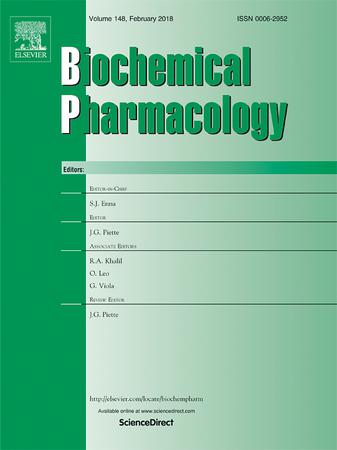Emerging roles of EGFL family members in neoplastic diseases: Molecular mechanisms and targeted therapies
IF 5.3
2区 医学
Q1 PHARMACOLOGY & PHARMACY
引用次数: 0
Abstract
Epidermal growth factor-like proteins (EGFLs) contain more than a single EGF/EGF-like domain within their protein structure. To date, ten EGFL family members (EGFL1-10) have been characterized across diverse tissues and developmental stages under different conditions. In this review, we conclude that EGFLs are instrumental in regulating biological activities and pathological processes. Under physiological conditions, EGFLs participate in angiogenesis, neurogenesis, osteogenesis, and other processes. Under pathological conditions, EGFLs are linked with different diseases, particularly cancers. Furthermore, we highlight recent advancements in the study of EGFLs in biological conditions and cancers. In addition, the regulatory role and key underlying mechanism of EGFLs in mediating tumorigenesis are discussed. This paper also examines potential antagonists that target EGFL family members in cancer therapeutics. In summary, this comprehensive review elucidates the critical role of EGFLs in neoplastic diseases and highlights their potential as therapeutic targets.

EGFL家族成员在肿瘤疾病中的新作用:分子机制和靶向治疗
表皮生长因子样蛋白(egfl)在其蛋白结构中包含不止一个EGF/EGF样结构域。迄今为止,已有10个EGFL家族成员(EGFL1-10)在不同条件下的不同组织和发育阶段被鉴定出来。在这篇综述中,我们认为egfl在调节生物活性和病理过程中起着重要的作用。在生理条件下,egfl参与血管生成、神经发生、成骨等过程。在病理条件下,egfl与不同的疾病有关,尤其是癌症。此外,我们强调了egfl在生物学条件和癌症研究中的最新进展。此外,本文还讨论了egfl在肿瘤发生中的调控作用及其关键机制。本文还研究了靶向EGFL家族成员的潜在拮抗剂在癌症治疗中的作用。总之,这篇全面的综述阐明了egfl在肿瘤疾病中的关键作用,并强调了它们作为治疗靶点的潜力。
本文章由计算机程序翻译,如有差异,请以英文原文为准。
求助全文
约1分钟内获得全文
求助全文
来源期刊

Biochemical pharmacology
医学-药学
CiteScore
10.30
自引率
1.70%
发文量
420
审稿时长
17 days
期刊介绍:
Biochemical Pharmacology publishes original research findings, Commentaries and review articles related to the elucidation of cellular and tissue function(s) at the biochemical and molecular levels, the modification of cellular phenotype(s) by genetic, transcriptional/translational or drug/compound-induced modifications, as well as the pharmacodynamics and pharmacokinetics of xenobiotics and drugs, the latter including both small molecules and biologics.
The journal''s target audience includes scientists engaged in the identification and study of the mechanisms of action of xenobiotics, biologics and drugs and in the drug discovery and development process.
All areas of cellular biology and cellular, tissue/organ and whole animal pharmacology fall within the scope of the journal. Drug classes covered include anti-infectives, anti-inflammatory agents, chemotherapeutics, cardiovascular, endocrinological, immunological, metabolic, neurological and psychiatric drugs, as well as research on drug metabolism and kinetics. While medicinal chemistry is a topic of complimentary interest, manuscripts in this area must contain sufficient biological data to characterize pharmacologically the compounds reported. Submissions describing work focused predominately on chemical synthesis and molecular modeling will not be considered for review.
While particular emphasis is placed on reporting the results of molecular and biochemical studies, research involving the use of tissue and animal models of human pathophysiology and toxicology is of interest to the extent that it helps define drug mechanisms of action, safety and efficacy.
 求助内容:
求助内容: 应助结果提醒方式:
应助结果提醒方式:


